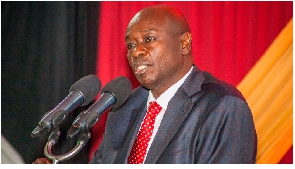 Kenya’s Deputy President Rigathi Gachagua
Kenya’s Deputy President Rigathi Gachagua
Kenya's Deputy President Rigathi Gachagua has called on African leaders in Sudan and the Democratic Republic of Congo (DRC) to prioritise peaceful resolution of conflicts as a means to entice warring factions to end Violence.
Gachagua spoke to an audience at the International Federation of Red Cross and Red Crescent Society's 10th Pan-African Conference Gala Dinner in Nairobi on Monday and argued for an urgent need to also address both natural and man-made disasters that have plagued Africa.
Sudan and DRC are among the African countries with hottest conflicts today, killing thousands and displacing millions of people from their homes.
He argued the problem is mostly political and could be solved if both sides sat at a table for peacefully negotiations.
The Red Cross is among humanitarian organisations that are often involved in rescue work and relief supplies. One of the most consistent crises in the Horn of Africa has been drought. In Somalia, Red Cross officials say insecurity has made it difficult to provide life-saving humanitarian work.
In Sudan, they say new violence has displaced more people, but overall climate change has made it difficult to provide food.
"Dealing with man-made disasters is not fair. We deal with two problems on this continent, and it is not fair," Gachagua said.
"We face natural calamities like famine, drought, floods, and all, but we also deal with man-made disasters out of armed conflict in Africa," he added.
He acknowledged the profound impact of armed conflicts on neighbouring countries and urged African leaders to prioritise peace and diplomacy over territorial disputes and resource conflicts.
Kenya has been heavily involved mediation in South Sudan, Sudan, Ethiopia, DRC and across the entire African continent where it has sent peacekeeping missions.
“The armed conflicts in Sudan have immensely affected our tea export and have affected our people who were working there and have come back home, I call upon our brothers in Sudan, the generals, to lay down their arms, enter into peaceful negotiations, and find a peaceful solution to whatever problems they have in Sudan,” he said.
However, Sudan has been criticising the role of President Ruto claiming, without evidence, that he sides with rebels Rapid Support Forces (RSF).
In April, the RSF clashed with the Sudan Armed Forces (Saf), ending an alliance that had seen them topple a transitional government two years earlier.
Since then, the Intergovernmental Authority on Development (Igad) created a Quartet led by Kenya and includes South Sudan, Ethiopia and Djibouti. Khartoum, however, rejected Nairobi's role.
In Nairobi, Gachagua extended the same plea to the leaders and armed factions in DRC, where Kenya had deployed soldiers to help maintain peace. Gachagua also stressed the importance of dialogue and negotiations for the sake of citizens and regional stability.
“We call upon the people of DRC to maintain peace and for all the armed leaders to give dialogue a chance for the sake of their citizens and for the sake of peace, not just in their country but in the region,” he urged.
Emphasizing the shared responsibility of African nations to foster an environment of peace, stability, and cooperation for the greater good of the continent.